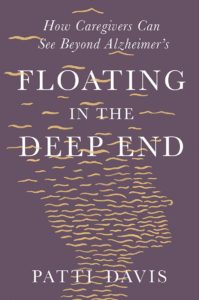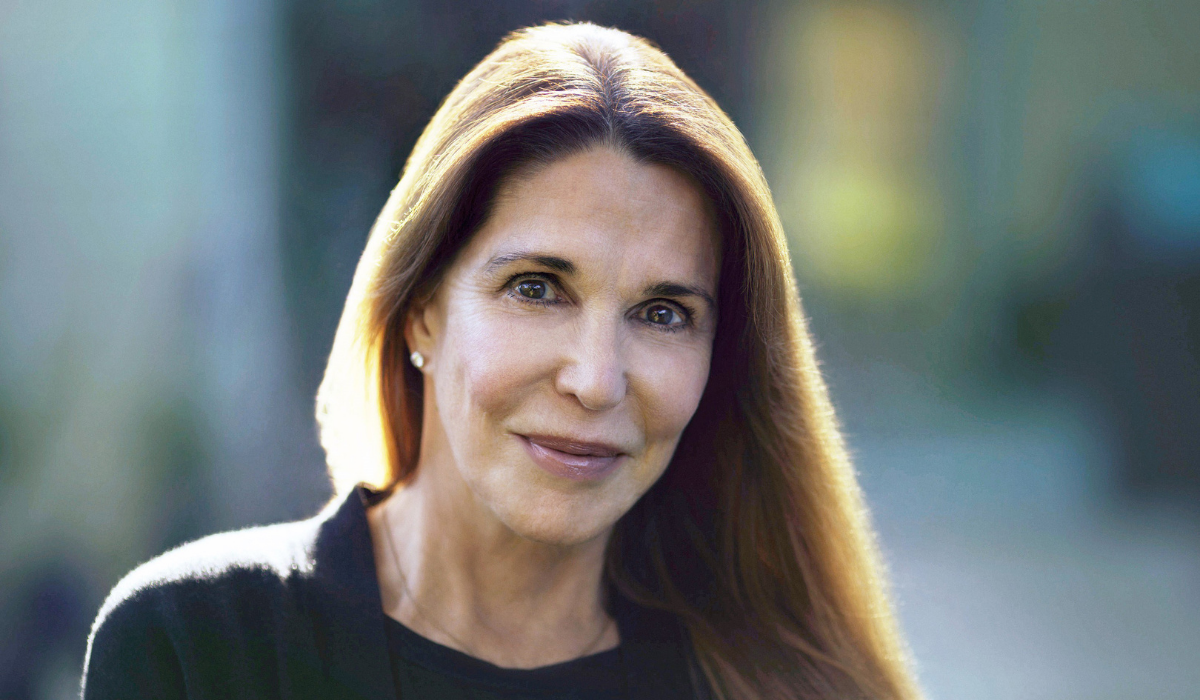Patti Davis on Her New Book…and Finding the Light while Caring for Loved Ones
A Conversation with Patti Davis
SL: When looking at Alzheimer's, it can be the default to only see the darkness and hardships. Yet you write that 'there are many colors on the palette of Alzheimer's.” Can you talk about the nuance and what we overlook?
PD: The temptation, particularly at the very beginning, is to think that this is the worst thing that can ever happen. That this is going to be a horrible few years or decade or however long it might be. Well, if you decide that, then that is going to be your experience of the experience. But [what ] if instead you acknowledge: Yes this is hard. And it's painful. And I must allow myself to grieve. But I don't know what the other aspects are going to be–That's what I did. I went: You know what? I have no idea what's going to happen here, but I am going to be open to whatever unfolds. I'm going to try to learn and grow from whatever unfolds. Because the truth of the matter is that that person's absence of cognition, absence of memory, and all the other things that go along with Alzheimer's, that's not the whole story of who that person is. There's still a soul in there. There are still emotions in that person. If you remember that, not only is your experience going to be different, but you're going to be different with that individual because you're going to be a more complete person with them.SL: This brings up the idea of grace. You write: 'We don't change in a linear pattern. There are leaps ahead, there are stumbles, and there are times we fall backward. That's particularly true when it comes to family dynamics.” Why do you believe it is so important for caregivers to show themselves grace?
PD: If you don't, you end up punishing yourself at every turn. Or you end up demanding more from yourself than maybe you can give at that moment. I got many things right with my father in the decade of his illness. But there were times that I didn't, and I knew that I needed to go: Okay that didn't work out so well. Next time around let's try it differently.There's a great line in A Course in Miracles that reads: ‘Do you want to be right? Or do you want to be at peace?' That's an important question to ask yourself. I don't think there's any wrong answer because sometimes the answer is: I want to be right. I don't care about being at peace right now. That happened to me a lot with my mother because she was part of this equation, too. I had a difficult relationship with her. If you ask yourself that question, and you own where you come down on that, it starts to change your agenda. Because the times that you go, ‘no, I want to be right' it ultimately doesn't feel so good because it's a very constricted way of being. So that's a really good tool.We don't get everything right anywhere in life, but particularly on a pilgrimage like this there are a lot of times that we stumble. There are a lot of times that we get something wrong. That's okay. That's how you learn. I'm trying to help other people from what I learned. But nobody…nobody!…goes, ‘oh, great. I got this. I know how to do this.'SL: My mother was a caregiver to her elderly parents for a decade and that's what she always yearned to hear: That no one has it all figured out when it comes to caring for someone with Alzheimer's. But she often felt dismissed when others would give her advice without having gone through it.
PD: In this book I write about other people's 'recommendations.” You have to be very careful who you talk to when you're going through this. That's the value of a support group. The one rule I had when I was running my support group was: no rudeness. You cannot be rude to another person. You may offer your opinions, you can give your feedback, but you cannot dismiss somebody else, and you cannot be rude to somebody else. The value of a support group is that everyone is at some point along this journey, and so you are with people who understand what you're going through. Outside of that, you have to be very careful about who you talk to because people have their opinions. I give a few examples in this book of people who said things to me that were harsh and inappropriate. And even though they were inappropriate, it was still painful.SL: For those who are caregivers to someone with Alzheimer's, what is your advice for seeing the light when times are dark?
PD: If there is a difficult time, or a difficult day, or a difficult hour with that person who has dementia, it's not going to last. Recently a friend, someone who is a physical trainer and working with a person in the early stages of Alzheimer's, told me that she was getting to the point where she had to really command her client on what to do but she was scared. She told me, ‘I'm scared because I don't want her to get angry at me.' And I said, ‘if she does, it's going to be over in 10 minutes. She won't remember it. You'll remember it. But she won't.'The bad thing about Alzheimer's is that people forget things. And the good thing about Alzheimer's is that people forget things. So, when it's a rough time or when they're stuck in a loop, or when they have a tantrum, know it's going to pass and they're not going to remember it.SL: How do you approach the grief of it all?
PD: The grieving process really needs to start early. We tend to think about grief as something that happens when people die, but the truth about Alzheimer's, or any kind of dementia, is that it's sort of a death before dying. It's important that people take the time at the beginning to sit with their own grief and let it start unfolding in them. We don't like to do that because it hurts. We'll use any excuse to not grieve, to run away from it, but that just doesn't work very well. We're a very impatient society. We have this microwave mentality and that everything's like a potato and should cook in three minutes. With something like grief, that's just not the case. It needs time.SL: Being a caregiver is so hard, but there are also many gifts, which you illuminate. What are some of those gifts?
PD: It can fundamentally change how you approach everything in life. If you can make those deeper changes in yourself in this kind of situation, you can do it in every other aspect of your life. And also, what I think is the most important and something I mentioned previously, is about looking at things differently. This is not just someone who is losing cognition. It's not just someone who is losing memory. I'm going to look at it from a broader perspective. I'm going to open my vision a little more and see them as a human being who has emotions and feelings. If you can develop those tools in yourself to do this, you can take those same tools to every other aspect of your life.It helped me a lot developing that with my father. He was such a sweet person, so it wasn't difficult to develop those tools with him. My mother was a different story. I was able to take those lessons [with my father ] and apply them to her. I was able to get out of my own woundedness from my relationship with her and look at the fact that she was wounded too.From Floating in the Deep End: How Caregivers Can See Beyond Alzheimer's
by Patti Davis
The 'long goodbye” of Alzheimer's can be looked at as a gift when compared to sudden and brutal deaths in mass shootings or other tragedies. Time, as it stretches out and seems to slow down, is a gift to treasure. Dementia is not a disease of wrenching physical pain. The suffering that dementia patients might experience when drifting back through the years and landing on certain memories can be hard to watch, but it's short-lived. They will move on; they will forget what upset them. That too is something to acknowledge and feel grateful for.When I think back on my father's illness, what comes to me first are the moments that shine brightly out of the shadows of Alzheimer's. I think of the afternoon when a rainstorm had just ended and I was sitting outside with him at my parents' house. The view was sparkling and clean. The billowing clouds overhead, the trees, and the city in the distance looked like a painting. He turned to me and said, 'He does good work.” I wasn't sure what he meant, but I guessed. 'God?” I asked him. 'Yep,” he answered, his eyes twinkling as they used to many years before.I think of walking with him along the boardwalk at the beach and the way he gazed out at the ocean. I wondered if he was longing to run across the sand and plunge into the waves the way he once could. There was something in his eyes that looked like a mix of loss and longing. People passing by would recognize him and call out greetings, almost always addressing him as either Mr. President or President Reagan. He'd always wave back and say hello to them. One day he turned to me and said, 'They all seem to know me. How do they know me?” I explained that they recognized him because he was famous when he was president of the United States years ago. He looked bewildered, shook his head a little like he was trying to jar a memory into place. But it didn't work. He didn't remember. I wanted to change the look in his eyes, so I started talking to him about the ocean. 'Nothing to be scared of with the ocean,” he said. And there was no fear in his eyes, no bewilderment, just the memory of water and tides. I think about the Christmas when our whole family was together, when my father looked at the tree and asked, 'Why is there a tree in here?” Michael tried explaining to him that it was Christmas, and this was the Christmas tree. It didn't register. I recall that a few of us tried to explain the holiday, with no luck. It finally became clear that the concept of Christmas was not registering. He was asking a very basic question: Why is there a tree in the living room? Eventually, we figured out that the key was just to answer the question simply. We told him that at this time of year, everyone puts pine trees in their living rooms, and we were just doing what everyone else was doing. He seemed to mull it over, nodded, and then said emphatically, 'Okay. Well, there you go.” It sticks out in my mind because he showed us something about dealing with Alzheimer's…sometimes you just need to answer the specific question in the most basic way, without inserting concepts like holidays or special occasions.I think about the day I went on a walk with him at a park near my parents' house. We were on a sidewalk across the street from the park when, from behind a gate, a dog barked at us. My father turned and barked back at the dog. At first, I was embarrassed. I looked around to see if anyone was nearby other than his Secret Service agents. I didn't want someone to see Ronald Reagan barking at a dog. But then my father looked at me and laughed. I thought, 'Who cares if someone sees him? The world knows he has Alzheimer's, and he's having a good time.”I think of all these moments and more with immense gratitude. Putting guilt in its place, asking it to leave the premises when it's not needed, is a process that is ongoing. Even when I knew better, I felt guilty sometimes…when I laughed with my father, when I felt a sense of peace unexpectedly wash over me, it would seem for a moment as if I were being disloyal to the seriousness of the disease. I had to remind myself again and again that there are many colors on the palette of Alzheimer's…some dark, some brighter. I owed it to myself, and I owed it to my father, to embrace all of them. Gratitude was one of the brightest colors, and it has followed me through the years, anchoring my memories and reminding me that as complicated as life can be, it can also be as simple as a shiny afternoon after the rain has passed and it feels like God is smiling.Order Floating in the Deep End here.
I think about the Christmas when our whole family was together, when my father looked at the tree and asked, 'Why is there a tree in here?” Michael tried explaining to him that it was Christmas, and this was the Christmas tree. It didn't register. I recall that a few of us tried to explain the holiday, with no luck. It finally became clear that the concept of Christmas was not registering. He was asking a very basic question: Why is there a tree in the living room? Eventually, we figured out that the key was just to answer the question simply. We told him that at this time of year, everyone puts pine trees in their living rooms, and we were just doing what everyone else was doing. He seemed to mull it over, nodded, and then said emphatically, 'Okay. Well, there you go.” It sticks out in my mind because he showed us something about dealing with Alzheimer's…sometimes you just need to answer the specific question in the most basic way, without inserting concepts like holidays or special occasions.I think about the day I went on a walk with him at a park near my parents' house. We were on a sidewalk across the street from the park when, from behind a gate, a dog barked at us. My father turned and barked back at the dog. At first, I was embarrassed. I looked around to see if anyone was nearby other than his Secret Service agents. I didn't want someone to see Ronald Reagan barking at a dog. But then my father looked at me and laughed. I thought, 'Who cares if someone sees him? The world knows he has Alzheimer's, and he's having a good time.”I think of all these moments and more with immense gratitude. Putting guilt in its place, asking it to leave the premises when it's not needed, is a process that is ongoing. Even when I knew better, I felt guilty sometimes…when I laughed with my father, when I felt a sense of peace unexpectedly wash over me, it would seem for a moment as if I were being disloyal to the seriousness of the disease. I had to remind myself again and again that there are many colors on the palette of Alzheimer's…some dark, some brighter. I owed it to myself, and I owed it to my father, to embrace all of them. Gratitude was one of the brightest colors, and it has followed me through the years, anchoring my memories and reminding me that as complicated as life can be, it can also be as simple as a shiny afternoon after the rain has passed and it feels like God is smiling.Order Floating in the Deep End here.
Please note that we may receive affiliate commissions from the sales of linked products.



